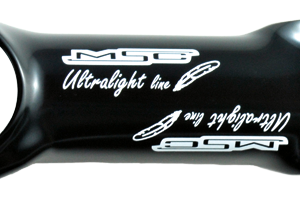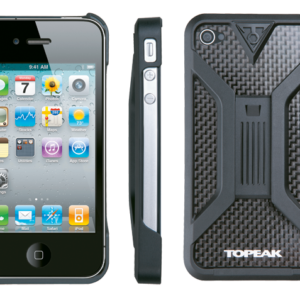 Another custom coloured dream bike designed by Danilo di Luca. You want stiff? You got stiff!
Another custom coloured dream bike designed by Danilo di Luca. You want stiff? You got stiff!
“The big draw for Kyklos bikes is the pedigree of the design put into this young brand. Kyklos bikes are co-designed by current pro rider Danilo Di Luca; not many bikes are designed by a current day Giro d’Italia winner!”
Sometimes it’s hard to know where to start with a bike review. Simon reviewed a Kyklos bike not long ago, in our 2011 November/December issue. This small Italian brand had a good intro then, so I won’t rehash too much nor use that as a segueway into the rest of the review. Being a man of mortal means I need to point out that this is a $15,000 bike. How about we get that out of the way right now? That’s a serious amount of coin and the Kyklos would want to be a very serious performer or a very beautiful bike, or preferably both.
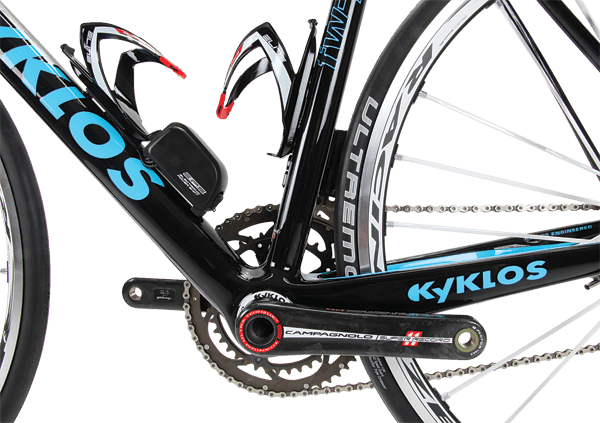
Beauty is in the eye of the beholder, and I can’t say a bad word about the visual appeal of the Featherweight Plus. Deep and ‘so-glossy-it looks-wet’ black paint with crisp baby blue graphics really floats my boat. And the white Fulcrum Racing Zero wheels and elegant Campagnolo drivetrain are a treat. Even if this bike rode like a dog I’d still look about as fast as I could ever hope to.
All Kyklos models make use of a BB30 bottom bracket shell and tapered steerer fork and are manufactured in Taiwan to the specs of Kyklos. The frame carries a ‘Painted in Italy’ sticker, which is a refreshingly frank statement. The geometry of the Featherweight Plus is fairly conservative, neither ultra-aggressive or casual. The big draw for Kyklos bikes is the pedigree of the design put into this young brand. Kyklos bikes are co-designed by current pro rider Danilo Di Luca; not many bikes are designed by a current day Giro d’Italia winner! The all-round geometry makes sense when you consider the designer is a Grand Tour rider.

The Featherweight Plus is a new model in the Kyklos line up which has been developed as an evolution of the existing Featherweight model. The geometry is the same and many of the tube profiles are also the same or at least close. Side by side it’s clear that the bikes are from the same family. The Featherweight Plus frame weighs a claimed 850g which is in keeping with bike’s name. Our test bike weighed in at 6.85kg without pedals in a 56cm, so getting below the UCI weight limit would be pretty simple given that there are no weight weenine parts in the build.
The Featherweight Plus differs from the other Kyklos models in terms of the grade of carbon used, which reputedly results in a frame that is both lighter and stiffer. The Featherweight Plus is the only model to use a traditional removable seatpost. It comes with a colour matched Kyklos post which makes for a smooth total package. The frame uses a nifty double clamp to secure the post into the frame: the upper clamp tightens around the post only, and the lower clamp tightens around the seat tube itself. This means that each bolt only needs a maximum of 6Nm to keep the post in place. Ergo both the post and frame can be made a little lighter. A removable post also means that if you change seats or have an injury and need to adjust your saddle height significantly then you can do this easily when compared with an integrated post. It also means that packing the bike to travel (Giro trip, anyone?) is much easier.
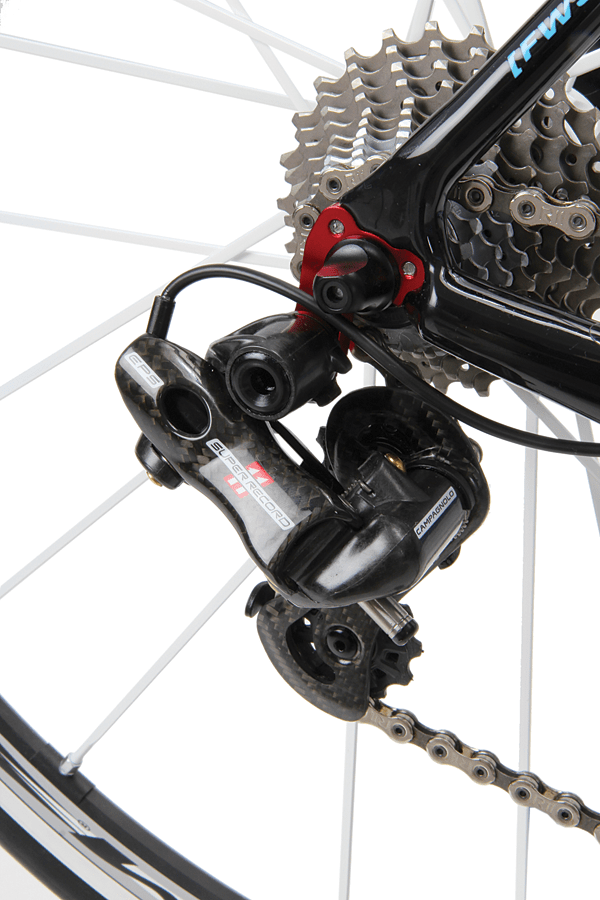
Our test bike came equipped with Campagnolo’s newish Super Record EPS electronic groupset, which is a major factor in the bike’s overall value. About half of the fifteen grand if you bought the groupset at the current retail price,. As much as this review is about the Kyklos frame, the bike on review has to factor in the group. This was my first time aboard an EPS equipped bike, and I need to start saving so that I can ensure it is not the last. Campagnolo have spent a long time developing this group, with special focus on the tactile experience. The lever shape is the same as the current 11 speed Ergo levers, which is a fantastic place to start. The hoods are textured with a grid-like pattern for extra grip and I found them to be very comfortable with or without gloves. The forefinger shift paddle has had the doughnut treatment, with the middle of the paddle removed. This small touch was excellent as it locates the point of your finger easily and allows the finger to actuate the lever in and out or side to side with no effort or thought. When compared with Shimano’s Di2 the EPS feels more ‘mechanical’. Whether you like this or not is up to you, but Campagnolo have made intentional effort to make this a feature of their electronic groups and I preferred this to the clinically cold precision of the Shimano groupset.
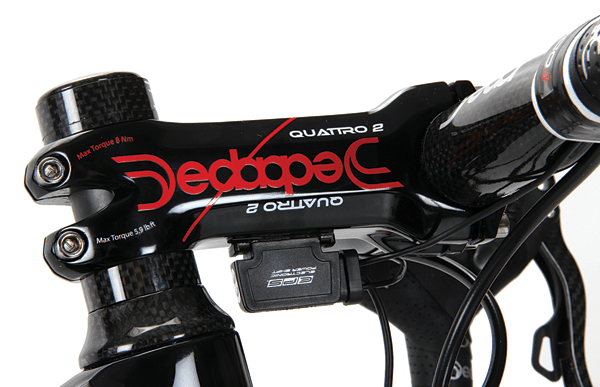
Coming from a SRAM equipped bike the EPS threw me off a little at first, as the short and ratchet like throw of the forefinger shift lever is extremely similar to the release action of the SRAM mechanical lever. Instead of dumping a few gears in one go I’d shift a few gears lower as my brain assumed I was shifting SRAM style. Once I got over this the EPS was dreamy. The ease of changing gear is a real eye-opener and makes you aware of how many small little thoughts and actions you invest in changing gear every time you saddle up. The ability to change several gears almost instantly and with no effort, regardless of the pedaling torque applied at the time, frees you to just be an engine instead of doing the thinking of an auto gearbox too. Bicycles have been called the ‘freedom machine’, and electronic shifting makes this term more accurate than ever as you can spend your thought and effort concentrating on or enjoying the ride itself. Over a long sportive like the Three Peaks Challenge, or a three week Grand Tour, the EPS system would save the rider a noticeable amount of energy.
With such a lovely Italian groupset it was nice to see that the Kyklos frame has electronic specific cable routing. The battery unit mounts via the bottle cage bolts and the cables emerge through a small port under the bottle cage itself to keep the aesthetics intact. There are no provisions on this frame for mechanical shifting, but Kyklos do offer the Featherweight Plus in a mechanical compatible configuration. If you intended to build a mechanical drive-trained Featherweight Plus it would be wise not to ride an electronic equipped test bike first, as an inevitable electronic groupset upgrade will immediately follow. You can’t build a beautiful bike such as this and not go all out.
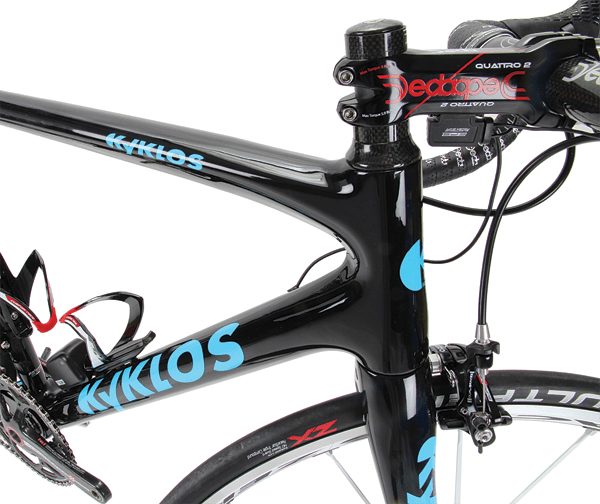
The balance of the Featherweight Plus is an all-Italian affair. Fulcrum, Deda, Selle San Marco. The high price tag makes sense when each part is considered. The efficiency of the Super Record EPS group is perfectly complemented by the Fulcrum Racing Zero wheels. These clincher wheels use ceramic bearings and Fulcrum’s distinctive 2:1 spoke pattern on the rear wheel. They are very stiff, roll smooth as butter and provide great braking. At under 1,500g for the pair they are unbeatable all-rounders which simply blend into the ride experience. I hadn’t ridden these wheels before but they’re very impressive and have gone onto the wish list. It should be noted here that the wheel build is a custom version done especially for the owner. In fact this frame can pretty much be specc’d with any wheel and component combination you care to mention.
The San Marco Concor saddle has a broad nose and flat profile with a moderate amount of padding which I found to be comfortable, be it in the drops, on the nose climbing, or sitting and plugging out a cadence on the flats.
Although the Campagnolo Super Record cranks do not feature a 30mm spindle, the BB30 bottom bracket and surrounds are more than stiff enough. Apparently Di Luca has prototype Kyklos bikes tested by his professional mates including Mr Pettachi before they are approved for production, so it’s not surprising that the back end of the Featherweight Plus is very, very responsive. The seat stays are positively spindly looking but the back end stays true when out of the saddle. And the point where they join the seat tube is a work of art.
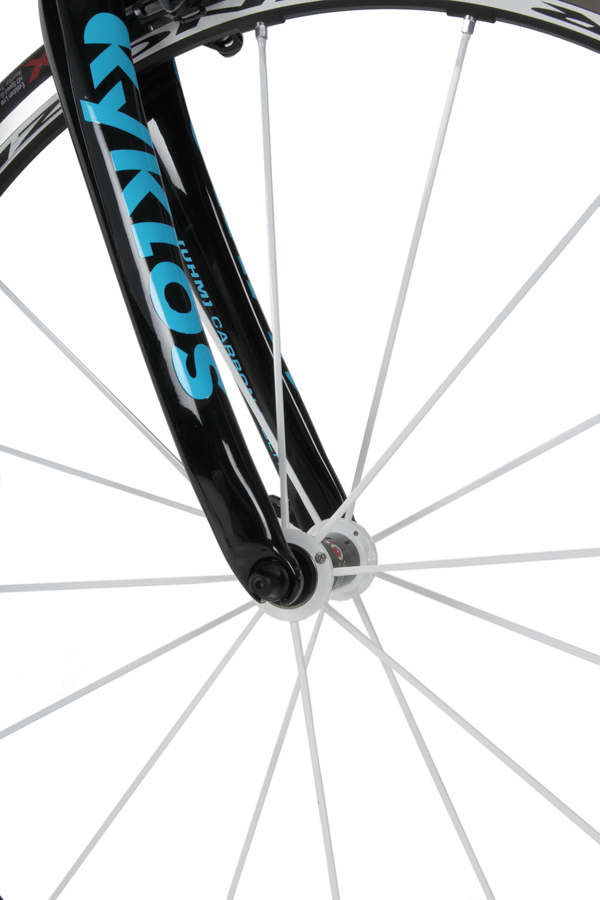
For such a solid bike the road feel is very good. Over typical suburban roads you get a nice transmission of the surface without being too beaten up. For a fast and stiff bike the Featherweight is more than capable of long rides on rougher roads. It’s no lounge chair, don’t get that wrong, but many of the Kyklos’s rivals offer a much harsher ride whereas the Featherweight considers the fatigue of a rough ride as well as the energy saved by a mercilessly stiff frame. The pedigree of the Kyklos does show on potholes and raised seams in the road, where a decent mule-kick is delivered through the frame and bars if you don’t pay attention. It’s a very acceptable trade off given the zippy feel of the frame.
Up front the Kyklos didn’t feel as taught during big out of the saddle efforts. The Deda bar has a give in it that contrasts with the unwavering rear triangle and the head tube area doesn’t feel quite as torsionally stiff as say, the Scott Foil we had a few issues back. Still, this is splitting hairs, and the Kyklos is not going to stop you from reaching the maximum speed that your body is capable of, and doing so damn quickly. Descending is intuitive and the Kyklos makes light work of high speed corners.
All of the componentry was selected by the bike’s owner, and they did a mighty fine job in their build. The local Kyklos importer, Ollo Industries, can help you put together a complete dream spec bike or guide you through a more standard build. This Featherweight Plus is the kind of bike that makes you want to keep riding all day long. Little out of the saddle bursts shoot you forward and attacking descents rewards you with extra speed. The EPS group and smooth rolling wheels keep you at speed once you’ve gained some steam. It’s an addictive and trance-like experience that is immensely enjoyable.

Quality
The Super Record EPS, Fulcrum wheels and gorgeous frame are pretty hard to fault. This is not a price point bike, it’s a bike that exists to be great. The paint is super nice and no corners were cut in this build. Too nice!
Value
At $15,000 any discussion of value is an emotive evaluation. This is a beautiful and unique bike with an enviable pedigree. How much that is worth is up to the potential owner. Remember that you can always spec the Kyklos to suit your own requirements and budget.
Performance
Faultless for an all-rounder road-racing bike. Smooth and responsive without being overly aggressive. The Featherweight Plus is a great ride that doesn’t excel in any one aspect, it goes up, down, across or around with equal aplomb.
Overall
If we ignore the price the Featherweight Plus is a really great bike. The spec complements the abilities of the frame perfectly. This is a bike you can get on, get pedaling, and then let yourself melt into the ride. It’s an experience that begs for more.
Specs
Frame: HM T1000 Carbon
Fork: Kyklos Carbon
Head Set: Deda
Stem: Deda Zero 100
Handlebars: Deda Zero 100
Saddle: Selle San Marco Concor
Seat: Post Deda Carbon
Shift Levers: Campagnolo Super Record EPS
Brakes: Shimano Campagnolo Record
Front derailleur: Campagnolo Super Record EPS
Rear Derailleur: Campagnolo Super Record EPS
Cassette: Campagnolo Super Record 12-27
Chain: Shimano Campagnolo 11 Speed
Crank: Campagnolo Super Record Carbon
Wheels: Fulcrum Zero with custom spokes
Tyres: Schwalbe Ultremo R1
Weight: 6.85kg without pedals
Price: $15,000
Distributor: www.olloindustries.com
